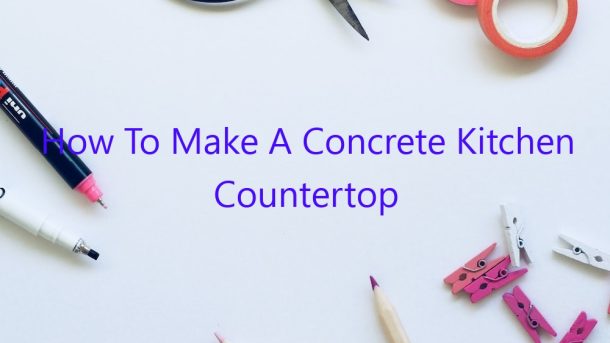Concrete has become a popular choice for kitchen countertops because of its durability and unique appearance. It is a relatively easy material to work with, and can be made to match any style.
The first step in making a concrete kitchen countertop is to create a mold. This can be done using a variety of materials, such as wood, metal, or plastic. The mold should be sturdy and slightly larger than the desired size of the countertop.
Next, a concrete mix is prepared. This can be done using a pre-mixed concrete or by creating a mixture of Portland cement, sand, and water. The mix should be thick enough to hold its shape when poured, but still be pourable.
The concrete is then poured into the mold and allowed to cure. This can take anywhere from a few hours to a few days, depending on the mix and the weather conditions.
Once the concrete is cured, the mold can be removed and the countertop is ready to be finished. The surface can be polished, stained, or sealed as desired.
Contents [hide]
Can you DIY concrete countertops?
Concrete Countertops are a hot trend, but they can also be expensive. So, the question is often asked, can you DIY concrete countertops? The answer is yes, you absolutely can, and it’s not as difficult as you may think.
The first step is to choose your concrete mix. You can buy a pre-mixed concrete, or you can make your own mix by combining Portland cement, sand, and water.
Next, you’ll need to prepare your countertop surface. The surface should be smooth and clean, and free of any imperfections. If you have any existing countertops, you may want to remove them before starting your project.
Once your surface is ready, you can start building your countertops. Start by creating a form for the countertops. This can be done using plywood or any other materials you have on hand. The form should be slightly larger than the countertops you are building, and it should be smooth and level.
Next, you’ll need to add a layer of concrete to the form. Be sure to smooth it out and make sure it is level. Then, let it dry completely.
Once the concrete has dried, you can add your next layer. Be sure to add enough concrete to create a smooth, level surface. Let the concrete dry completely, and then add your final layer.
Once the concrete has dried, you can start adding your countertop details. You can use molds, or you can create your own designs. Be sure to let the concrete dry completely before adding any finishing touches.
Concrete countertops can be a great way to add some personality to your kitchen. And, if you DIY them, they can also be a cost-effective way to upgrade your kitchen. So, if you’re thinking about adding some concrete countertops to your kitchen, be sure to give DIY a try.
Is it cheaper to make concrete countertops?
There is no definitive answer to the question of whether it is cheaper to make concrete countertops. The cost of making a concrete countertop will vary depending on the design, the size of the countertop, and the materials used in the countertop. However, in general, concrete countertops are less expensive than other types of countertops, such as granite or marble.
Concrete is a very durable material, and it can be stained or painted to match any color scheme. In addition, concrete is very easy to clean and it is resistant to bacteria and mold. This makes it a good choice for a kitchen countertop.
If you are interested in making a concrete countertop, there are a few things that you will need to consider. First, you will need to find a concrete countertop contractor. There are a number of companies that specialize in concrete countertops, and they can help you design and build a countertop that will meet your needs.
Second, you will need to choose a concrete mix. There are a number of different mixes available, and you will need to choose one that is suitable for your project.
Third, you will need to choose a color and texture for your countertop. There are a number of different options available, and you can choose a color and texture that will match your kitchen décor.
Finally, you will need to decide whether you want to add a sealer to your countertop. A sealer will protect your countertop from staining and fading, but it will also make it more difficult to clean.
If you are considering making a concrete countertop, it is important to weigh the pros and cons of doing so. By considering the factors listed above, you can make an informed decision about whether a concrete countertop is the right choice for your home.
What kind of concrete do you use for countertops?
There are a few different types of concrete you can use for countertops. Here we will discuss the benefits and drawbacks of each type.
One option is to use standard concrete. This is the cheapest option, but it can also be the least aesthetically pleasing. Standard concrete is usually very heavy and can be difficult to work with. It can also be susceptible to staining and scratches.
Another option is to use polished concrete. This is a more expensive option, but it can be very durable and easy to maintain. Polished concrete is also very light weight and can be customized to match any color or style.
A third option is to use concrete overlay. This is a thin layer of concrete that is applied over an existing surface. This is a good option if you want the look and feel of concrete, but don’t want to deal with the weight or durability of actual concrete.
The type of concrete you choose will depend on your needs and budget. Ultimately, the best option is the one that best suits your individual needs.
Is concrete a good kitchen countertop?
Is concrete a good kitchen countertop?
That is a question that many homeowners are asking themselves, and the answer is not always clear. There are pros and cons to using concrete as a kitchen countertop material.
On the plus side, concrete is durable and can last for many years. It is also a very affordable option, and it can be customized to match your specific style and needs.
However, there are some drawbacks to using concrete as a kitchen countertop. It can be difficult to maintain, and it can also be susceptible to stains and scratches.
Ultimately, the decision about whether or not to use concrete as a kitchen countertop is up to the individual homeowner. There are pros and cons to both options, and it is important to weigh the pros and cons of each before making a decision.
Do I need rebar in concrete countertop?
Do I need rebar in concrete countertop?
When it comes to countertops, there are many options to choose from, including concrete. Concrete is a popular choice because it is durable and can be customized to match any style. One question that often comes up with concrete countertops is whether or not rebar is needed.
Rebar is a metal bar that is used to reinforce concrete. It helps to strengthen the concrete and can help prevent it from cracking or breaking. If you are concerned about the durability of your concrete countertop, rebar may be a good option to consider.
However, rebar is not always necessary. In most cases, concrete will be strong enough without it. If you are unsure whether or not rebar is needed, it is best to consult with a professional. They will be able to advise you on the best course of action for your specific situation.
Ultimately, the decision of whether or not to use rebar in your concrete countertop is up to you. If you are concerned about the durability of your countertop, rebar may be a good option. However, if you are looking for a more affordable and traditional option, concrete without rebar will likely be just fine.
Will concrete countertops crack?
Concrete countertops have become a popular choice in recent years, as they are a unique and aesthetically pleasing option. However, one common concern with concrete countertops is whether or not they will crack.
The answer to this question depends on a few factors. The main thing that determines how likely a concrete countertop is to crack is the mix design. If a concrete countertop is designed correctly, it will be much less likely to crack. In addition, the installation and curing process are also important factors to consider. If the countertop is installed correctly and allowed to cure properly, it will be much less likely to crack.
That said, concrete countertops are not completely immune to cracking. If a countertop is subjected to a lot of stress, it may crack. However, proper installation and mix design can help to minimize this risk.
If you are considering a concrete countertop, be sure to consult with a professional to ensure that the countertop is designed and installed correctly. By taking these steps, you can help to ensure that your concrete countertop does not crack.
Can you put hot pans on concrete countertops?
Can you put hot pans on concrete countertops? The answer to this question is both yes and no. It depends on the type of concrete countertop that you have.
If you have a concrete countertop that is sealed with a sealant, you can put hot pans on it. However, if you have a concrete countertop that is not sealed, you should not put hot pans on it. The heat from the pans can damage the countertop.
If you are not sure whether your concrete countertop is sealed or not, you can test it by putting a little water on it. If the water beads up and does not soak into the concrete, the countertop is sealed. If the water soaks into the concrete, the countertop is not sealed.




